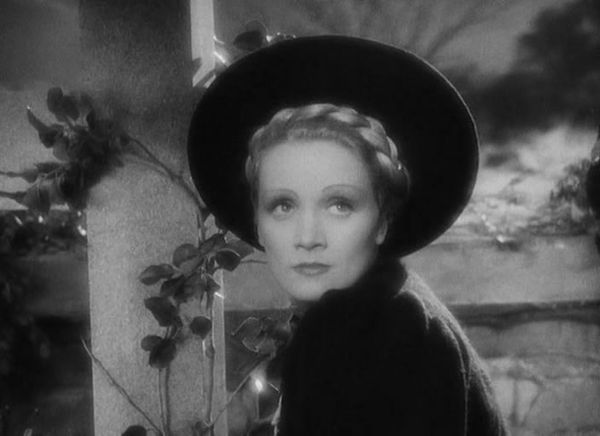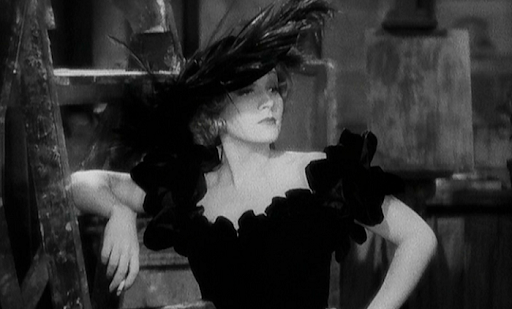Casting Marlene Dietrich as a naïve German peasant girl in 1933 might seem an odd choice, but Dietrich carries off her role in director Rouben Mamoulian’s The Song of Songs, now on Blu-ray from Kino Lorber,with remarkable nuance. She plays Lily, a romantic young woman sent to live with her aunt Rasmussen (Alison Skipworth) in Berlin, following the death of her father. Lily becomes fascinated by the dashing young sculptor Richard (Brian Aherne) living across the street, and he’s fascinated by her—as a model for his latest sculpture, “The Song of Songs.” Lily sneaks out every night to pose for Richard, and the pair gradually fall in love. But Richard is still more interested in his art, and Baron von Merzbach (Lionel Atwill) has grown obsessed with Lily’s image.
The Song of Songs is an odd film, even beyond the casting of the thirty-two-year-old Dietrich as a naïve young woman. At times it veers into a sort of studied German romanticism that comes off a bit cloying; at others, it makes use of fantastic chiaroscuro and its leading lady’s undoubted range to craft a story about manipulation and female identity. Dietrich spends most of the first half of the film speaking in a higher pitched, more breathy voice than we’re accustomed to, and while it’s initially weird to see her playing a character so contrary to type, she instills a passionate, naïve sexuality into her performance that’s fascinating to watch. And there is no doubt that she eventually becomes “Dietrich” over the course of the film, as the various male character manipulate and attempt to bend her to their will.

The Song of Song is very much about men attempting to shape Lily into their ideal. Richard at first sees her as nothing but a body, something to be studied, not attached to a real person with real desires. The Baron is attracted first by a nude drawing Richard has done of her, only belatedly realizing that there’s even a face attached to the body. The film follows the progression of men trying to mold Lily – literally and figuratively – until she conforms to what they want. The Baron is obsessed with possessing her body and making her into something that other men, especially Richard, will envy. Richard only belatedly realizes that he’s more or less sold her into marriage when he abandons her to the Baron, and even then his passion is still fixated on his own needs and not hers. The only character who provides any sort of sympathy for poor Lily is the Baron’s housekeeper, initially jealous of her arrival, who slowly begins to understand just how badly she’s being treated.
And, yes, Dietrich does eventually become Dietrich, transforming before our eyes into an adult woman of studied, controlled sexuality. The entire film could be analyzed through the lens of male imposition on the female body and the eventual reclamation, in part at least, of her autonomy via her “downfall” into sexual deviance. The film’s embrace of sexuality is interesting in itself, hinting at without ever explicitly stating nudity and promiscuity.
The cinematic fascination with Dietrich’s face and body carries with it a further element of the consumption of her as an image. By 1933, Dietrich was a bonafide star—she had played showgirls and prostitutes, and her long-time collaboration with director Josef von Sternberg had crafted a particular image of dangerous, alluring, soft-focused sexuality. Her qualities were sometimes tragic, but also extraordinarily self-possessed—here was a woman who lured unsuspecting men to their doom, but also carried within herself a range of emotions and passions that belied the more basic image of the femme fatale.

So to cast Dietrich in a role that has her going from naivete to knowledge via men who want to mold her according to their desires certainly carries with it a metatextual relationship with Dietrich’s own star persona. Lily is Dietrich before she becomes Dietrich, formed not by perverse promiscuity but by male manipulation. For much of the film, Lily is a victim of her own emotions and passions, and, more than that, her utter trust in transcendental love. Richard abuses that trust and the Baron takes pleasure in making her suffer. As she comes to learn more about the world that men drag her into, she sheds her naivete and begins to embrace her own sexuality, as a sort of revenge against the men who require it of her. By the time she goes “full Dietrich” nearing the end of the film, her tragedy and her autonomy go hand in hand. She has been bartered for, molded by, and sold by men, and so she finally comes to a point where she molds and sells herself.
The Song of Songs isn’t a perfect film by any stretch, and at times its gender relations are extraordinarily problematic, but it does give insight into Dietrich’s range, the humor underlying some of her persona, and the nuance underlying her image. Kino Lorber’s Blu-ray release renders every shadow in gorgeous detail. There’s a marvelous sense of catharsis at the end of the film, not just for Lily, but for Dietrich, as she finally gains power over her own image.


